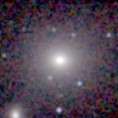NGC 4709
| NGC 4709 | |
|---|---|
 2MASS image of NGC 4709. | |
| Observation data (J2000 epoch) | |
| Constellation | Centaurus |
| Right ascension | 12h 50m 03.9s[1] |
| Declination | −41° 22′ 55″[1] |
| Redshift | 0.015604[1] |
| Helio radial velocity | 4678 km/s[1] |
| Distance | 150 Mly (45 Mpc)[2] |
| Group or cluster | Centaurus Cluster (Cen 45 subgroup) |
| Apparent magnitude (V) | 12.0[1] |
| Characteristics | |
| Type | E1[1] |
| Size | ~127,700 ly (39.14 kpc) (estimated)[1] |
| Apparent size (V) | 2.4 x 2.0[1] |
| Other designations | |
| ESO 323-3, CCC 130, MCG -7-26-56, PGC 43423[1] | |
NGC 4709 is an elliptical galaxy[3] located in the constellation Centaurus.[4] It is considered to be a member of the Centaurus Cluster[5][6] and is the dominant member of a small group of galaxies known as "Cen 45"[7] which is currently merging with the main Centaurus Cluster (Cen 30)[8] even though the two subclusters' line of sight redshift velocities differ by about 1500 km/s.[9] NGC 4709 was discovered by astronomer James Dunlop on May 7, 1826.[10]
Distance estimates
Lucey et al. suggests that NGC 4709 and the Cen 45 subgroup lie at about the same distance as the main Centaurus Cluster[11][8] which is about 150 Mly (45 Mpc).[2]
See also
External links
- NGC 4709 on WikiSky: DSS2, SDSS, GALEX, IRAS, Hydrogen α, X-Ray, Astrophoto, Sky Map, Articles and images
References
- 1 2 3 4 5 6 7 8 9 "NASA/IPAC Extragalactic Database". Results for NGC 4709. Retrieved 2018-04-12.
- 1 2 New horizons in globular cluster astronomy : proceedings of a conference held at Università di Padova, Padova, Italy, 24-28 June, 2002. King, Ivan R., Piotto, G. (Giampaolo) (1st ed.). San Francisco, Calif.: Astronomical Society of the Pacific. 2003. ISBN 1583811435. OCLC 54022703.
- ↑ "Your NED Search Results". ned.ipac.caltech.edu. Retrieved 2018-04-13.
- ↑ "Revised NGC Data for NGC 4709". spider.seds.org. Retrieved 2018-04-13.
- ↑ Jerjen, H.; Dressler, A. (1997-07-01). "Studies of the Centaurus cluster". Astronomy and Astrophysics Supplement Series. 124 (1): 1–12. Bibcode:1997A&AS..124....1J. doi:10.1051/aas:1997355. ISSN 0365-0138.
- ↑ O'Meara, Stephen James (2013-04-08). Deep-Sky Companions: Southern Gems. Cambridge University Press. ISBN 9781139851541.
- ↑ Lucey, J. R.; Currie, Malcom J.; Dickens, R. J. (1986-07-01). "The Centaurus cluster of galaxies – II. The bimodal velocity structure". Monthly Notices of the Royal Astronomical Society. 221 (2): 453–472. Bibcode:1986MNRAS.221..453L. doi:10.1093/mnras/221.2.453. ISSN 0035-8711.
- 1 2 Churazov, E.; Gilfanov, M.; Forman, W.; Jones, C. (1999). "Evidence for Merging in the Centaurus Cluster". The Astrophysical Journal. 520 (1): 105. arXiv:astro-ph/9802166. Bibcode:1999ApJ...520..105C. doi:10.1086/307421. ISSN 0004-637X.
- ↑ Walker, S. A.; Fabian, A. C.; Sanders, J. S. (2013-11-11). "An XMM–Newton view of the merging activity in the Centaurus cluster". Monthly Notices of the Royal Astronomical Society. 435 (4): 3221–3230. arXiv:1308.2090. Bibcode:2013MNRAS.435.3221W. doi:10.1093/mnras/stt1515. ISSN 0035-8711.
- ↑ "New General Catalog Objects: NGC 4700 - 4749". cseligman.com. Retrieved 2018-04-11.
- ↑ Lucey, J. R.; Currie, Malcolm J.; Dickens, R. J. (1986-10-01). "The Centaurus cluster of galaxies – III. Its structure and the distribution of the different galaxy types". Monthly Notices of the Royal Astronomical Society. 222 (3): 427–447. Bibcode:1986MNRAS.222..427L. doi:10.1093/mnras/222.3.427. ISSN 0035-8711.
This article is issued from
Wikipedia.
The text is licensed under Creative Commons - Attribution - Sharealike.
Additional terms may apply for the media files.